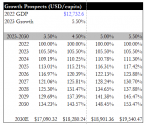supercat
Colonel
A thread about China's rural economy, the rural home ownership is a whopping 96%, while its 87% in the cities. Those who thought China's economy will collapse anytime soon really have no clue.
Your description of how the Chinese government views capital is both accurate and how things should be. However, you are wrong in the assertion that China faces a dilemma - China is simply so vast and growing so quickly that business will eat whatever it's served. If they don't feel secure, tough; they can't quit China.
When you invest in China, you invest in the sectors the government likes if you know what's good for you.
Currency swaps, Chinese buying RMB-dominated debt issued by other countries, buying crude oil and other resources with RMB, etc….Doesn't answer the question. How exactly is large scale Yuan internationalization possibly without get rid of capital control?
Currency swaps, Chinese buying RMB-dominated debt issued by other countries, buying crude oil and other resources with RMB, etc….
All of them together. Other countries can issue a lot of RMB-denominated debt, and China buys plenty of resourcesI said large scale. Currency swaps only gets you so far
In what world is 220$ disposable income/month considered extreme poverty?A thread about China's rural economy, the rural home ownership is a whopping 96%, while its 87% in the cities. Those who thought China's economy will collapse anytime soon really have no clue.
And why bet on 8% when he think 5.5% is the most likely outcome? There are a lot of things I am trying to make sense of.
Furthermore both of the options highlight influence of central government.
1. Implies the bubble deflation AKA government policy is the primary cause of drastic fall in price.
2. Implies government is responsible for greatly lowered price and can make it go back up at will.
I am failing to see how either his scenario support his argument of "this is no longer 2013 real estate is not at mercy of government".
Speaking personally for the area I was investing much of the restriction are still in place. If one day the government say "we are dropping all these restrictions for the forseeable future" house price will resurge fairly quickly. That is what I meant by central policy dictates real estate price. Right now China is giving some signals of relaxing the restrictions but they did not fully commit to it. It is natural market did not respond with increased pricing. Much of the commercial real estate is also failing due to low customer from past covid restriction. Once again a central government decision.
My last point is much of the Chinese economy do not behave on market force alone. It is futile to use western economic to predict China because much of the uderlying assumption do not match. I will not insist people to agree with me on this point. I am trying to explain where I came from and why I am saying what I said. Feel free to ignore me otherwise.
We will see if Abeconomic's 5% is right haha.
For you to see "if I'm right" - it would help that you first accurately remember what I wrote.
Also, as much as I'm trying to be approximately right about the short term (note, 5.5 or 5.7 or 5.3 - the difference is really not that important), what really matters is whether structural reforms are being executed in 2023/2024 successfully - this is what will determine whether GDP CAGR through 2030 starts with a 3 handle or a 4 handle.

